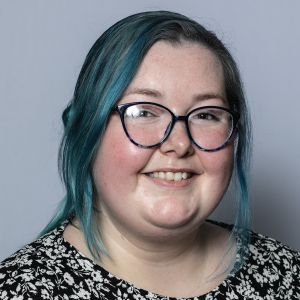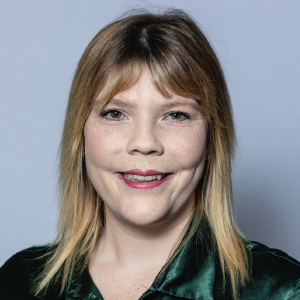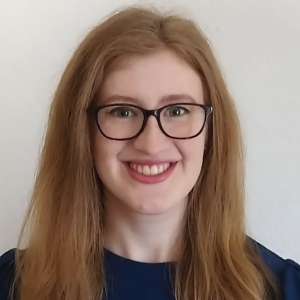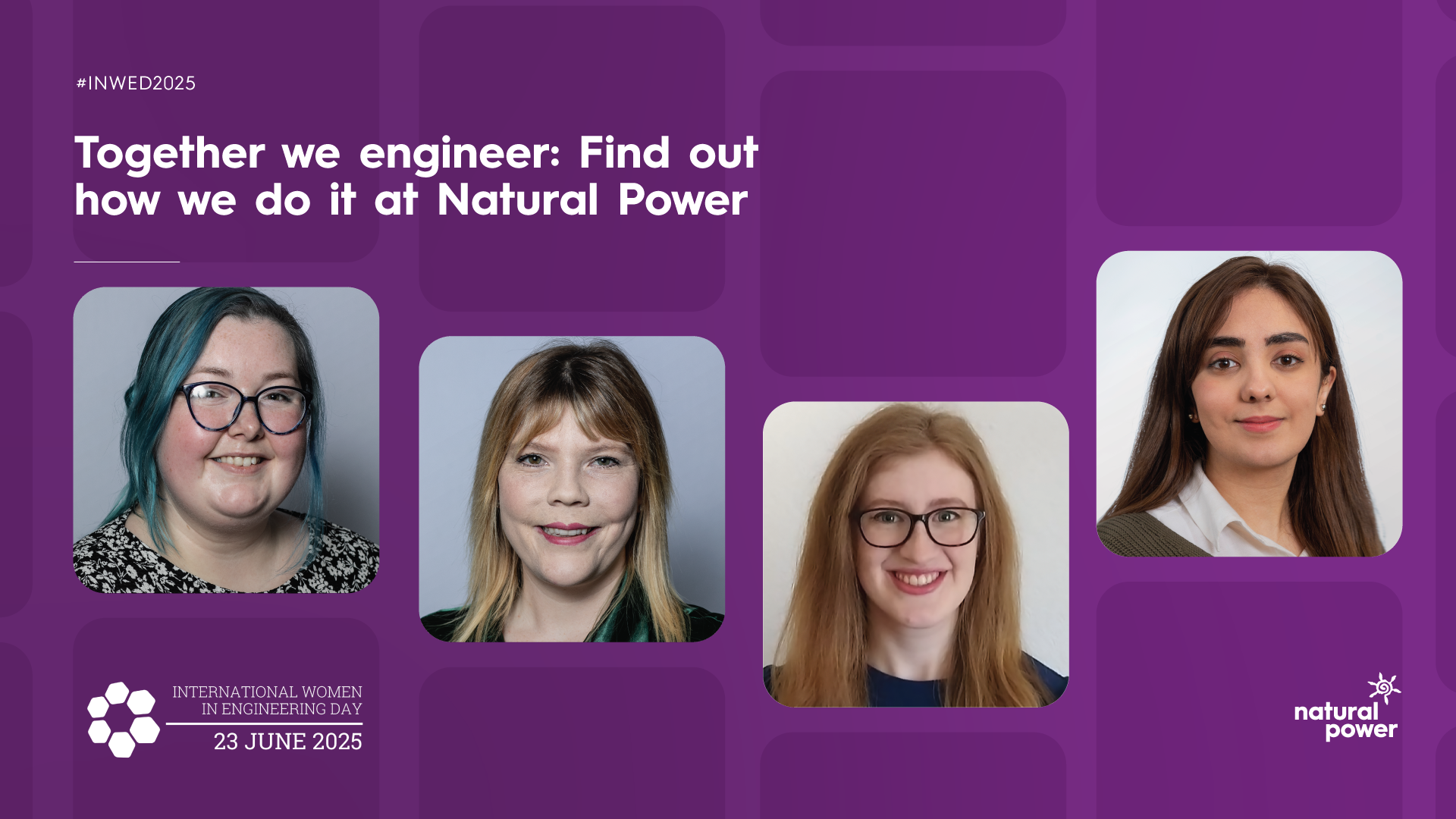This International Women in Engineering Day we asked a few of our team to share their thoughts on being a woman in the sector.

Name: Mhairi Hopkins
Job title: Engineering CAD Technician
Name an inspiring woman and why?
Since I started working at Natural Power, Mhairi Bowley has had a huge impact on me. Prior to my role here, I worked almost exclusively with men, and I let a lot of micro, and at times flat out, aggressions slide as I didn’t feel I could speak up or correct men in the way they were acting. The way Mhairi carries and asserts herself has shown me I don’t need to accept unfair treatment and can speak up when I need to. She’s one of the most knowledgeable engineers I’ve ever worked with and is more than happy to share her expertise. Mhairi has also been such an incredible support throughout my time at Natural Power. She has always made herself available for a chat, supporting me in both the highs and lows.
What do you find to be the biggest challenge as a woman in a male dominated sector?
Being the only woman in the room. It can be hard to be heard in a male dominated industry, especially when most industry leaders are men. One of my favorite things about working at Natural Power is working with the women within my team.
What advice would you give to any young girls who are considering a career in engineering/renewables?
Don’t let anything or anyone hold you back. The path isn’t always straight. I studied art and I’m here. Every side quest is taking you where you’re meant to be. So don’t be so hard on yourself if you’re not where you want to be, if it’s taking a little longer than you hoped or you don’t know where you’re going. As my mam always says, “what’s for you won’t go by you”.
What has been your biggest personal achievement while working as an engineer/in renewables?
I don’t have a single achievement. The growth in my knowledge and skills has been my biggest achievement. In the two and a half years I’ve been with Natural Power, my professional growth has been exponential. This is all due to the mentorship, support, and guidance that the DAS Team has provided.
What could the industry/workplace do to ensure that women feel treated fairly by their male co-workers?
In the construction industry, renewables (in my experience) is one of the better fields to work in as a woman. This doesn’t mean it can’t be better. Women aren’t always taken seriously as professionals. Input in our area of expertise can often, and quickly, be dismissed purely because of our gender. It’s far too common for women to be met with condescension and belittling. The attitude towards women in the construction industry is just one of the things that needs to change for us to feel fairly treated.
What do you like most about working at Natural Power?
The opportunity for professional development at Natural Power is unmatched. I came to Natural Power from an architectural background, knowing very little about renewable project design and development, and I have been given access to a wealth of knowledge and skills. Training with both internal and external resources has been provided for anything I and/or my team think would be beneficial. Any opportunity for growth or gaps in knowledge or skill has been met with enthusiasm and a positive attitude.
What would you like the renewables industry to look like in 20 years’ time?
I would like to see more women in all aspects of the industry, from technical roles to CEOs.

Name: Nazgol Ahari
Job title: Renewable energy analyst
Name an inspiring woman and why?
Maryam Mirzakhani. Growing up in Iran with an interest in science, she was one of the few visible examples of what was possible. Her work was brilliant, but more than that, she challenged expectations — not just as a woman in STEM, but as someone who did it quietly and confidently, on her own terms. She made the path feel a little more real for the rest of us.
What do you find to be the biggest challenge as a woman in a male dominated sector?
It’s the feeling of not being fully seen. Whether it was being called “he” in official emails, or people assuming I was admin staff at a conference, there’s this quiet but constant undercurrent that you don’t quite belong. Even in Iran, university entry requirements were stricter for women in engineering. You carry that history with you. It’s not always overt — but it adds up.
What advice would you give to any young girls who are considering a career in engineering/renewables?
Don’t wait for someone to validate your interest. If you’re curious and capable, that’s enough. Take it seriously, believe in your work, and don’t second-guess your place in the room. You don’t need to be perfect — just persistent.
What has been your biggest personal achievement while working as an engineer/in renewables?
Starting from scratch in a new country and adapting quickly — academically, professionally, and culturally — has been a challenge in itself. In my first year, I built an AI model that’s now being used across different projects. But honestly, the bigger achievement has been learning to back myself, even when things felt uncertain.
What could the industry/workplace do to ensure that women feel treated fairly by their male co-workers?
It starts with awareness. When a team lacks diversity, there’s often less empathy for different experiences. So part of it is improving representation — but it’s also about accountability. Are women being heard? Are they progressing at the same rate? Are biases being challenged? And above all, are we being treated like any other colleague — not differently, just equally?
What do you like most about working at Natural Power?
Even though I’m currently the only woman in the analytics team in the UK, I’ve never felt sidelined or dismissed. What I really appreciate is that people respond to ideas — not assumptions. It’s a collaborative, respectful environment where your input matters, regardless of gender or background.
What would you like the renewables industry to look like in 20 years’ time?
More balanced — in every sense. More women, more cultural diversity, more people entering from different disciplines and backgrounds. I’d like to see better integration between academia and industry, and less of a gap in who gets visibility and opportunity. I think the industry is heading that way, and it needs to.

Name: Natalie Leader
Job title: Project Engineer
Name an inspiring woman and why?
My biggest inspiration in life is my mother. She has always been my greatest supporter, the one who stood by me and my sister. Juggling a full-time job while raising two children, she showed me the true meaning of resilience and relentless determination. Her work ethic and boundless compassion taught me that women possess a strength that is both quiet and powerful. Through every high and low, she was there, not just as a comforting presence, but as my fiercest advocate. From her, I learned not only to believe in myself, but also to stand up for myself and others. Her example continues to inspire me every day, shaping the person I strive to become.
What do you find to be the biggest challenge as a woman in a male dominated sector?
As a neurodivergent woman, one of the biggest challenges I face is imposter syndrome. I was never the top student, so I had to work incredibly hard to get to where I am today. In the early stages of my career, being surrounded predominantly by men often felt intimidating and isolating. I constantly felt the pressure to prove myself, not just as a professional, but as someone who deserved a seat at the table. I’ll never forget the time I was asked in a meeting if I was there just to take notes. After that, I found myself starting introductions with “I’m an engineer” just to be taken seriously. While the imposter syndrome hasn’t disappeared entirely, it’s become quieter as I’ve grown more confident in who I am and embraced my true, authentic self. Still, there are moments when it resurfaces, but now I face it with a deeper understanding of my worth and the strength that comes from being unapologetically me.
What advice would you give to any young girls who are considering a career in engineering/renewables?
The advice I would give to young girls is this: don’t listen to that voice in your head telling you you’re not good enough because you absolutely are. You don’t have to be the top student or have everything figured out. What matters most is passion and perseverance. Once you find what drives you, it will carry you further than you ever imagined. Hard work, determination, and belief in yourself will open doors you never thought possible. There is a place for you in engineering and now, more than ever, we need your voice, your ideas, and your perspective. So don’t give up. Keep going, keep growing, and trust that you are capable of achieving your dreams and so much more.
What has been your biggest personal achievement while working as an engineer/in renewables?
Throughout my career in renewables, I have achieved many accomplishments, but the most meaningful has been turning a personal journey into a platform for change. After being diagnosed with autism as an adult, I chose to use my lived experience of going undiagnosed for most of my life to advocate for other neurodivergent professionals who may feel unable to speak up. Through my involvement in Natural Power’s Equality, Diversity, and Inclusion (EDI) Group, I co-founded the company’s Neurodiversity Network. It has been incredibly rewarding to see the impact this has had not only within my workplace, but across the wider industry through the conversations and insights I have shared in my LinkedIn articles.
What could the industry/workplace do to ensure that women feel treated fairly by their male co-workers?
The focus should not just be on what the industry or workplace can do to ensure women are treated more fairly, it’s also about what men can do to become more aware of how they engage with the women around them. Change begins with individual accountability. I once attended a meeting where I was the only woman among 20 men, and I was collectively addressed as one of the “gents.” Moments like that may seem small, but they speak volumes. They make women feel invisible rather than included. If we want real progress, we need a cultural shift that starts with conscious, everyday actions. True inclusion isn’t performative; it’s intentional.
What do you like most about working at Natural Power?
I feel genuinely seen, supported, and valued. Being able to show up as my authentic self without fear of judgment is both empowering and transformative. It’s this kind of culture that fosters true belonging and brings out the very best in people.
What would you like the renewables industry to look like in 20 years’ time?
Over the next 20 years, there’s so much I hope to see evolve within the renewables industry. Above all, I want it to be a space where people feel empowered to show up as their true, authentic selves because when individuals can be genuine, their contributions become even more powerful. My vision is for a more inclusive industry, one that not only welcomes diversity but actively cultivates a sense of belonging for everyone. We need all voices, diverse backgrounds, perspectives, and identities to drive innovation and progress. I hope to see a significant increase in women pursuing and thriving in STEM roles, and importantly, more women stepping into leadership positions, especially on boards that remain largely male-dominated. When people feel seen, supported, and valued, anything is possible and that’s the kind of future we must strive towards.

Name: Fiona Lucas
Job title: Senior Technical Advisor
Name an inspiring woman and why?
Hedy Lamarr, a multifaceted icon.
What do you find to be the biggest challenge as a woman in a male dominated sector?
Simultaneously dealing with imposter syndrome while also ensuring your voice is heard and you receive the recognition you are owed for your work.
What advice would you give to any young girls who are considering a career in engineering/renewables?
It is a worthwhile and rewarding career path. It may seem daunting, but you are not alone, women in STEM will be your biggest supporters. Times are changing!
What has been your biggest personal achievement while working as an engineer/in renewables?
Successfully managing my first due diligence project by myself through financial close – I finally felt like maybe I did know what I was doing.
What could the industry/workplace do to ensure that women feel treated fairly by their male co-workers?
Workplaces need to acknowledge that there is an imbalance and implement inclusion strategies. Men need to become better allies.
What do you like most about working at Natural Power?
I feel that Natural Power is leading the way to creating an inclusive atmosphere and putting EDI strategy at the forefront.
What would you like the renewables industry to look like in 20 years’ time?
I hope for a more diverse, inclusive industry, one where I am not the only woman on the conference call.

